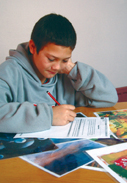|
||||
|
||||
Introduction: Attitudes and Motivation The national monitoring assessment programme recognises the impact of attitudinal and motivational factors on student achievement in individual assessment tasks. Students’ attitudes, interests and liking for a subject have a strong bearing on progress and learning outcomes. Students are influenced and shaped by the quality and style of curriculum delivery, the choice of content and the suitability of resources. Other important factors influencing students’ achievements are the expectations and support of significant people in their lives, the opportunities and experiences they have in and out of school, and the extent to which they have feelings of personal success and capability. National monitoring surveys seek information from students about their curriculum preferences and their perceptions of their achievement. Students are asked about their involvement in curriculum-related activities within school and beyond. The surveys are administered to students in groups of four students, with most questions requiring short written answers and others a written response. |
||||||||||||||||||||||||||||||||||||
| |
||||||||||||||||||||||||||||||||||||
| The
writing survey sought information from students about their curriculum
preferences and perceptions of their achievement. It was administered
to the students in a session that included both team and independent
tasks (four students working together or individually on tasks, supported
by a teacher).
Students were asked what writing activities they liked most at school, choosing up to three responses from a list of six. The percentages of students choosing each option are summarized below.
|
||||||||||||||||||||||||||||||||||||
| Compared to Mäori students in general education, students in Mäori immersion settings were much more positive about letter writing and writing in the context of other subjects, but much less positive about writing poems or keeping a diary. | ||||||||||||||||||||||||||||||||||||
| Students
were then asked what writing activities they liked to do in their own
time, choosing their favourite activity from a list of six options. Again,
compared to Mäori students in general education, students in Mäori
immersion settings were more positive about letter writing and less positive
about writing poetry. |
|
|||||||||||||||||||||||||||||||||||
 Asked
what “people need to do to be good writers”, students could
choose up to three things from a list of ten. Compared to Mäori students
in general education, students in Mäori immersion settings chose
“use their imagination” much less and “write neatly”
and “talk about their work with others” much more. Asked
what “people need to do to be good writers”, students could
choose up to three things from a list of ten. Compared to Mäori students
in general education, students in Mäori immersion settings chose
“use their imagination” much less and “write neatly”
and “talk about their work with others” much more. |
|
|||||||||||||||||||||||||||||||||||
| Students were asked to write down what they needed to do to “get better in writing” (see table below). For each student, up to three distinct responses were coded and tallied under eight headings. Compared to Mäori students in general education, students in Mäori immersion settings placed greater emphasis on improving their editing and checking, their neatness, and how often they wrote, and less emphasis on improving their spelling.
Rating
items •
were much more positive about writing at school |
||||||||||||||||||||||||||||||||||||
|
| Continue to Te Hauora - Health Survey >> |
| Continue to Te Mätauranga Korikori - Physical Education Survey >> |